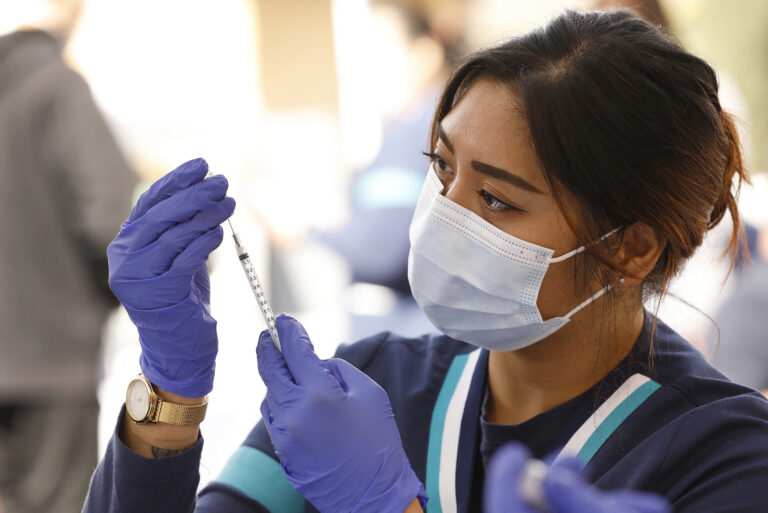
This article was originally published by Radio Free Asia and is reprinted with permission.
Authorities in Shanghai on Friday ordered more than a million of its residents into lockdown and mass testing, amid reports that some 200 million people are currently under some form of pandemic-related restrictions affecting their daily lives due to Chinese leader Xi Jinping’s zero-COVID policy.
The announcement for Shanghai’s Yangpu district prompted fears that at least some of the city’s 25 million residents could see a return to the food shortages and barriers to medical care seen during the citywide lockdown earlier this year.
Since the end of the ruling Chinese Communist Party congress at the weekend, zero-COVID restrictions have been “clearly stepped up in a rising number of cities, as containing COVID remains a key performance measure for local officials,” Reuters quoted a research note from Japan’s Nomura Securities as saying.
China on Friday reported 1,337 new COVID-19 cases — most of them asymptomatic. Eleven of those were in Shanghai.
Protests over COVID-19 restrictions in the Tibetan capital Lhasa spread to at least four different areas of the city Thursday, prompting “scuffles” with authorities in some cases, sources told Radio Free Asia, as ethnic Chinese migrant workers demanded permits to return home from the region.
Shanghai disease prevention worker Tao Li said nobody from Xinjiang, Tibet or Inner Mongolia is currently allowed to enter the city.
“Shanghai is concealing high numbers of positive tests in new arrivals, with about 20 cases a day,” Tao said. “If you test positive coming into the city, you have to go to a designated public health hospital at Jinshan, but it’s full now, so a lot of people are sleeping in the corridors and near the toilet entrances.”
“They’re charging 2,000-3,000 yuan (U.S. $275-415) per bed per day,” she said. “If you want a room to yourself you need to go through the back door [have connections].”
Hohot in week 3 of lockdowns
A resident of Hohhot, regional capital of Inner Mongolia, which borders the independent country of Mongolia, said people there are running out of supplies after lockdowns that have been going on for more than 20 days.
“At first I thought it would last a week, then it extended to 10, then 20, then 25 days,” the resident, who gave only the surname Bai, told RFA.
“I’ve no idea when it will be lifted; I’ve asked all around, but they’re not saying. There are new cases every day,” he said.
An employee who answered the phone at the Hohhot municipal government hotline on Thursday declined to comment on the lifting of restrictions.
“There is no notification [on that] at the current time,” the employee said.
Bai said residents are now facing skyrocketing food prices and supplies that are fast running out.
“There are six people in our family,” he said. “Right now we still have some rice, and maybe enough noodles for a couple of days, but there is nothing to go with it; I just made the last dish today.”
“A pound of vegetables usually costs three or four yuan, but that has now doubled or even tripled, and meat is so expensive that I can’t buy it,” Bai said. “Rice is now eight yuan a pound, when it used to be five yuan a while ago.”
He said residents are increasingly fractious, with shouting matches breaking out in the middle of the night and the constant sound of ambulance sirens going back and forth. Only white-clad disease prevention workers in full protective clothing can be seen on the streets.
Police in Hohhot’s Xincheng district said in an Oct. 26 statement that two people had been placed under administrative detention, which can be handed down to perceived “troublemakers” by police for up to 15 days without need for a trial, for violating COVID-19 restrictions.
A resident of the city’s Saihan district who gave only the surname Yang said many residents are now completely dependent on online food deliveries.
“Fortunately, we have some food stocked up in our freezer, meat and eggs, along with rice, flour, grain and oil as well,” Yang said.
Inner Mongolia reported 263 confirmed cases and 1,919 asymptomatic infections on Oct. 26.
Yang believes there were many more cases in his local area than were reported officially, however. “It’s all being covered up,” he said.
Lockdowns in multiple other cities
Meanwhile, a college student living in the central city of Wuhan who gave only the surname Fang said a number of residential compounds in Qiaokou, Jianghan and Hanyang districts are currently under lockdowns affecting around a million people.
“A lot of communities in Hankou have been locked down, including in [my district] Qiaokou, Jianghan and Hanyang,” Fang told RFA. “It’s pretty exaggerated given that there were 24 cases reported.”
“The scenic areas at Donghu and Moshan have also been closed. They’re pretty big with plenty of open space, so there was no risk, but they closed them anyway,” she said.
“Small businesses, supermarkets large and small and stalls are no longer allowed to sell vegetables, particularly in Qiaokou, which is near Tongji Hospital,” Fang said. “I heard a patient there brought the virus back from Xinjiang.”
Authorities in the southern city of Guangzhou reported 73 new cases on Thursday, and imposed restrictions on residential communities in Haizhu, Yuexiu, Tianhe and Liwan districts.
And 36 colleges and universities in the southeastern city of Fuzhou are currently under lockdown, with partial restrictions in place in Lanzhou, Xining, Zhengzhou, Datong and Xi’an.
Taiwan-invested Apple supplier Foxconn said some employees at its Zhengzhou factory had been affected by the outbreak there but denied online rumors that 20,000 people had tested positive at the plant.
0 comments :
Post a Comment